

Economics of Networks. The math of social networks. A social network is constituted by a number of units (nodes) that are connected to each other by a defined relationship -- for example, "x cites y", "x sends 5 email messages a week to y", "x and y belong to an organization in common. " There are a few wrinkles -- the units may be persons, organizations, cities, journal articles, or other types of entities; the relationships may be uni-directional or bi-directional; and the linking relationships may represent categorical relationships or intensity relationships.
"x and y are friends" is a bi-directional relationship; "x and y are close friends" is a bi-directional relationship recording intensity. Some of the basic questions about a social network are easy to formulate but difficult to assess. Basically, we would like to know what groups of individuals are unusually closely interconnected with each other, relative to the average for the population as a whole. Rise of the Event-Based Social Networks. With interest in location-based social networks (LBSN) hitting an all-time high with Foursquare's recent funding announcement valuing the company at $115 million, a new type of social networking has emerged that borrows some of the mechanics and incentives from location-based services: event-based social networks (EBSNs).
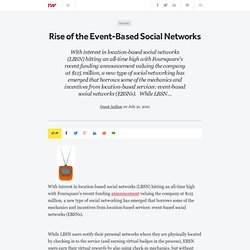
While LBSN users notify their personal networks where they are physically located by checking in to the service (and earning virtual badges in the process), EBSN users earn their virtual rewards by also using check-in mechanics, but without actually being physically present at a location. Alex Calic (@alexcalic) is currently working on an undisclosed start-up having spent the past 10 years at several tech companies. A Social Network Development Model. Weekend Reading: Social Networking for Businesses, by Rawn Shah. We have talked about the power of utilizing social networks for businesses before in our Weekend Reading series with books like The Facebook Era, by Clara Shih and Crush It!
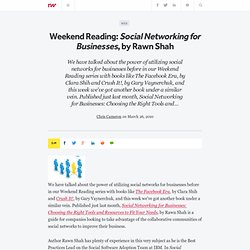
, by Gary Vaynerchuk, and this week we've got another book under a similar vein. Published just last month, Social Networking for Businesses: Choosing the Right Tools and Resources to Fit Your Needs, by Rawn Shah is a guide for companies looking to take advantage of the collaborative communities of social networks to improve their business.
Author Rawn Shah has plenty of experience in this very subject as he is the Best Practices Lead on the Social Software Adoption Team at IBM. Key Video From The World Economic Forum’s Social Networking Powerhouse Panel. Each year the World Economic Forum at Davos holds number of technology focused sessions.
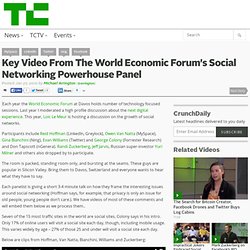
Last year I moderated a high profile discussion about the next digital experience. This year, Loic Le Meur is hosting a discussion on the growth of social networks. Participants include Reid Hoffman (LinkedIn, Greylock), Owen Van Natta (MySpace), Gina Bianchini (Ning), Evan Williams (Twitter) and George Colony (Forrester Research) and Don Tapscott (nGenera). Randi Zuckerberg, Jeff Jarvis, Russian super-investor Yuri Milner and others also dropped by to participate. The room is packed, standing room only, and bursting at the seams. Each panelist is giving a short 3-4 minute talk on how they frame the interesting issues around social networking (Hoffman says, for example, that privacy is only an issue for old people, young people don’t care.).
Beyond Social: Read/Write in The Era of Internet of Things. This blog was founded in 2003 on the philosophy of a read/write Web - a Web in which people can create content as easily as they consume it.
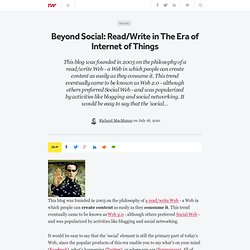
This trend eventually came to be known as Web 2.0 - although others preferred Social Web - and was popularized by activities like blogging and social networking. Social Networks for Things. At the recent DLD Conference (Digital - Life - Design) in Munich, Germany, Esther Dyson moderated a panel on the Internet of Things.
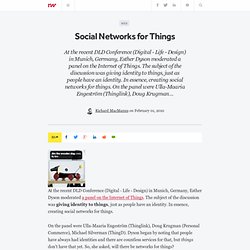
The subject of the discussion was giving identity to things, just as people have an identity. In essence, creating social networks for things. Patient-Driven Social Network Refutes Study, Publishes Its Own Results. It’s probably the first crowd-sourced clinical trial ever, and it certainly marks a breakthrough for social media as a force in the realm of medical research.
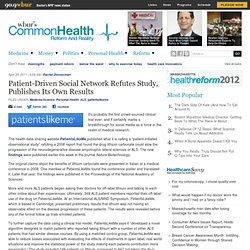
The health-data-sharing website PatientsLikeMe published what it is calling a “patient-initiated observational study” refuting a 2008 report that found the drug lithium carbonate could slow the progression of the neurodegenerative disease amyotrophic lateral sclerosis or ALS. The new findings were published earlier this week in the journal Nature Biotechnology. Adult-driven growth in social networks. Well this is interesting in the context of the net-gen discussion: “The traditional early-adopter model would say that teenagers or college students are really important to adoption [...]
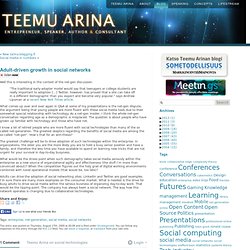
Thinking about social objects. You’ll see one day when you move out it just sort of happens one day and it’s gone.
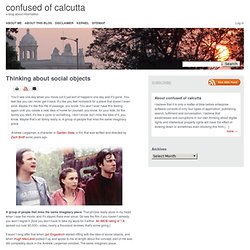
You feel like you can never get it back. It’s like you feel homesick for a place that doesn’t even exist. Maybe it’s like this rite of passage, you know. You won’t ever have this feeling again until you create a new idea of home for yourself, you know, for your kids, for the family you start, it’s like a cycle or something. I don’t know, but I miss the idea of it, you know. Global Guerrillas: THE BUBBLE. Nearly the entire world's population of 6.7 billion is now mediated in some form -- via phone to radio to TV to Internet -- and a majority have been mediated by two-way technologies.
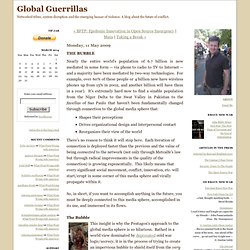
For example, over 60% of these people or 4 billion now have wireless phones up from 15% in 2002, and another billion will have them in a year). It's extremely hard now to find a sizable population from the Niger Delta to the Swat Valley in Pakistan to the favellas of Sao Paulo that haven't been fundamentally changed through connection to the global media sphere that: Shapes their perceptionsDrives organizational design and interpersonal contact Reorganizes their view of the world There's no reason to think it will stop here. Each iteration of connection is deployed faster than the previous and the value of being connected to the network (not only through Metcalfe's law but through radical improvements in the quality of the connection) is growing exponentially.
What The F**K is Social Media? David Weinberger: what information was. Posted by Ethan on Nov 10th, 2009 in Berkman, ideas | 6 comments There are many things I admire about my friend and colleague, David Weinberger: his intellectual curiosity, his generosity with his time and guidance, his sense of humor… One facet of David I most admire is his willingness to think in public.
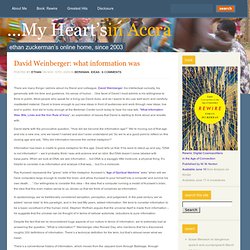
Most people who speak for a living (as David does, and as I aspire to do) use well-worn and carefully roadtested material. David is brave enough to put new ideas in front of audiences and work through new ideas, live and in public. And we’re lucky enough at the Berkman Center lunch today to hear his new talk, “What Information Was: Bits, Links and the Iron Rule of Irony”, an exploration of issues that David is starting to think about and wrestle with. The meaning of network culture - Kazys Varnelis. Whereas in postmodernism, being was left in a free-floating fabric of emotional intensities, in contemporary culture the existence of the self is affirmed through the network. Kazys Varnelis discusses what this means for the democratic public sphere.
Not all at once but rather slowly, in fits and starts, a new societal condition is emerging: network culture. As digital computing matures and meshes with increasingly mobile networking technology, society is also changing, undergoing a cultural shift. Just as modernism and postmodernism served as crucial heuristic devices in their day, studying network culture as a historical phenomenon allows us to better understand broader sociocultural trends and structures, to give duration and temporality to our own, ahistorical time.
Pew Research Center's Internet & American Life Project. Findings: Older Adults and Social Media Social networking use among internet users ages 50 and older has nearly doubled—from 22% to 42% over the past year. While social media use has grown dramatically across all age groups, older users have been especially enthusiastic over the past year about embracing new networking tools. Paul Gillin on Social Media and the Open Enterprise. Update Nov. 21: Social Rebate’s PR agency took issue with my opinions below, stating: For a journalist of your caliber, I would have expected you to do more than just ‘scour the website pretty thoroughly.’ If you were interested in a story—even a story critical of Social Rebate—I would have expected you to reach out, interview a Social Rebate representative, and perhaps even interview some of the company’s small business clients.
Perhaps your perspective would have changed, perhaps not. Too Many Online Friends? Time to Delete. The 12 Best Ways To Customize Your Facebook Pages. When a service such as Facebook limits users’ creative freedom, it is inevitable that other add-on services will overcome this limitation. This is why then, we see more and more Facebook tab apps that give us more control and freedom when it comes to customizing a fan page or a personal profile. I can’t really understand why Facebook doesn’t create an editor that lets users create a super fan page. I can only guess they don’t want to deal with it and prefer their uniform design, which may be boring but at least it is consistent and familiar.
Instead, Facebook lets other people get creative and offer an array of Facebook related apps built on the API. In any case, you must know this by now: A personalized page can drive more attention and probably, more traffic to your brand. I’ve written about this subject over, and over, and over again here at TechCrunch. But I digress. How it works: You just need to log-in with Facebook Connect, then the service will recognize your existing pages. After 150, Facebook friends are meaningless. (PhysOrg.com) -- According to Oxford University's professor of evolutionary anthropology, Robin Dunbar, after you have amassed 150 friends on Facebook, any more are meaningless because the human brain can only remember 150 meaningful relationships anyway.
Professor Dunbar says this number applies to different societies and has remained unchanged throughout history. Is a Facebook/Syphilis Connection 'Ridiculous'? Yesterday, the Telegraph ran an article about a study that seemed to have found a connection between the spread of syphilis and the popularity of Facebook. Today, the paper has run a follow-up story, wherein "Facebook has said that reports linking the site's rise to an increased incidence of the bacterial infection syphilis are 'ridiculous'".
According to the article, a Facebook spokesman has said that the initial report ignores "the difference between correlation and causation", but is the idea so unbelievable? Are we falling into the trap of technological determinism in thinking that Facebook could actually aid in and cause the spread of STDs? Facebook and the brutal economics of connection - How the World Works. Hyper-Social Enterprise: What it Takes to Lead One. Technology Review: Blogs: arXiv blog: The New Science of Network Archaeology. The study of networks has exploded in recent years. The Facebookisation of the enterprise. Complexity and Social Networks Blog. Leapfrogging into a Carbon-Light Future: The End of High-Carbon Prosperity and How Low-Income Nations Are Becoming Climate Resilient. Martin Wright asks whether low-income countries are on a fast track to low-carbon prosperity.
The tropical sun is beating down. It's Who You Know. Continual Prosperity. The Rational Optimist: How Prosperity Evolves. Study on Social Networking and Personal Genomics.